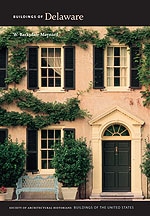You are here
Lum House (Lums Mill House, Samuel Davies House)
This early, three-bay, pent-eave brick house was probably built by Samuel Clement, who bought the property in 1724 and established a mill in 1736. Traditionally, it was the birthplace of Andrew Jackson's grandmother and also a home of Samuel Davies, a founder of Princeton University (the latter claim is doubtful). Two John Lums owned it successively, and their millpond provided water for the summit pool of the C&D Canal. The common-bond east wing was added later and heightened post-1809; a strange rear wall of boulders is apparently later still. The dwelling is much altered inside. The vicinity was the scene of extensive dumping when the canal was widened, a process involving steam shovels and train cars (1921–1923). The road in front of the house was once forty feet lower than today. By 1962, the Lum House was rapidly disintegrating and at risk of destruction by the Army Corps of Engineers. Attention was drawn to it by a resources survey commissioned by the National Park Service, Philadelphia, under John S. Cotter. Repairs were made, but today the front wall of the boarded-up building shows an alarming bulge.
Writing Credits
If SAH Archipedia has been useful to you, please consider supporting it.
SAH Archipedia tells the story of the United States through its buildings, landscapes, and cities. This freely available resource empowers the public with authoritative knowledge that deepens their understanding and appreciation of the built environment. But the Society of Architectural Historians, which created SAH Archipedia with University of Virginia Press, needs your support to maintain the high-caliber research, writing, photography, cartography, editing, design, and programming that make SAH Archipedia a trusted online resource available to all who value the history of place, heritage tourism, and learning.













